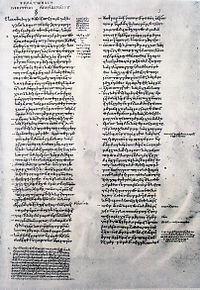Republic (Plato)

Title page of the oldest manuscript: Paris, Bibliothèque Nationale, Gr. 1807 (9th century)
|
|
| Author | Plato |
|---|---|
| Original title | Πολιτεία |
| Country | Ancient Greece |
| Language | Greek |
| Subject | Political philosophy |
| Published | around 380 BC |
The Republic (Greek: , Politeia; Latin: De Re Publica) is a Socratic dialogue, written by Plato around 380 BC, concerning the definition of justice (), the order and character of the just city-state and the just man—for this reason, ancient readers used the name On Justice as an alternative title (not to be confused with the spurious dialogue also titled On Justice). The dramatic date of the dialogue has been much debated and though it might have taken place some time during the Peloponnesian War, "there would be jarring anachronisms if any of the candidate specific dates between 432 and 404 were assigned". It is Plato's best-known work, and has proven to be one of the world's most influential works of philosophy and political theory, both intellectually and historically. In it, Socrates along with various Athenians and foreigners discuss the meaning of justice and examine whether or not the just man is happier than the unjust man by considering a series of different cities coming into existence "in speech", culminating in a city called Kallipolis (Καλλίπολις), which is ruled by philosopher-kings; and by examining the nature of existing regimes. The participants also discuss the theory of forms, the immortality of the soul, and the roles of the philosopher and of poetry in society.
While visiting the Piraeus with Glaucon, Polemarchus asks Socrates to join him for a celebration. Cephalus, Polemarchus, and Thrasymachus are then each asked their definitions of justice by Socrates. Cephalus defines justice as giving what is owed. Polemarchus says justice is "the art which gives good to friends and evil to enemies". Thrasymachus proclaims "justice is nothing else than the interest of the stronger". Socrates overturns their definitions and says that it is your advantage to be just and disadvantage to be unjust. The first book ends in aporia concerning its essence.
...
Wikipedia
